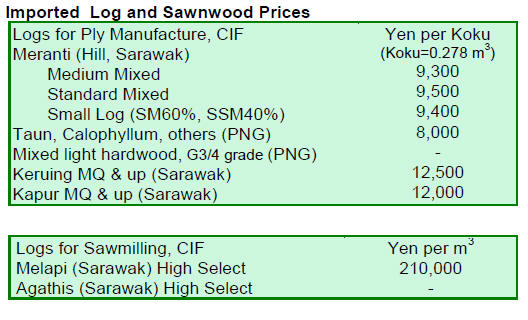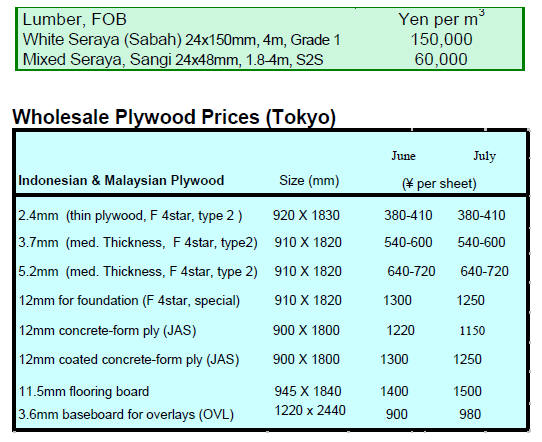Japan Wood Products
Prices
Dollar Exchange Rates of
29th July 2011
Japan Yen 76.77
Reports From Japan
Seihoku plywood production recovering
Seihoku's Ishinomaki plywood plants sustained
considerable damage during the March earthquake and
tsunami but clearing of debris and repairs to the machinery
is progressing well say the Japan Lumber Reports (JLR).
Seihoku plans to dispatch the first structural softwood
plywood this month end and the other Seihoku plant will
begin production in late August. By late October, both
plants will be producing one million sheets a month
reports the JLR.
The rotary lathe in the third plant was not badly damaged
so veneer production is underway. Drying is carried out in
the third plant and gluing, pressing and finish are done at
the number one plant.
The company reportedly plans to produce 150,000 sheets
this month and the target is to make 400,000 sheets in
August and 600,000 sheets in September.
Flood of import disrupts plywood market
In Osaka inventories of imported 12 mm plywood have
grown dramatically due to the arrival of imports, orders
for which were rushed to suppliers imediately after the
March earthquake.
In the port of Senboku, south of Osaka, more than five
ships had to wait off-shore as they could not unload. Some
of these vessels had been re-directed from the original port
of destination as they could not unload as planned due to a
lack of warehouse capacity.
Traders are reporting that the plywood market continues to
be depressed and that wholesalers and retailers are
carrying considerable inventories.
The price of 12mm structural panels dropped by Yen 350
per sheet from the peak of Yen 1,550 to about Yen 1,200
delivered.
Concrete formboard panels (JAS/F4star) prices are Yen
1,150 and coated concrete formboard prices are at Yen
1,250 yen per sheet. Both are down by more than Yen 100
per sheet from levels in June.
June orders for houses builders remain flat
Major house builders are reporting that June demand was
about the same as June last year.
Sekisui House, the largest builder in Japan, reported that
orders for detached units in June were 15% down from
June last year, the first decline in 22 months. However,
orders for apartments were up by 22 %, but orders for
units built for sale dropped by 8%. Overall, the housing
sector business, including renovation works, was 6% up.
Daiwa House reported a modest increase of custom
ordered detached units, the first increase in four months
but at only plus 1% the figures are barely changed from
one year ago. Orders for units built for sale were up by
1% while the overall sales of properties were up by 4%.
Sarawak log producers maintain firm stand on prices
When the rain season arrived in Sarawak logging was
curtailed and log prices increased. Further increases were
caused but a surge in demand after the March earthquake
in Japan.
The news in June this year was that log buyers in both
India and China had begun to slow purchases of logs as
prices were seen spiralling beyond their capacity to absorb
the increases. At the same time plywood mills in Sarawak
also reduced purchases of logs after the surge in demand
from plywood importers in Japan eased.
The JLR is saying that Japanese log buyers continue to
request a reduction in log prices but that the suppliers are
ignoring these requests. In particular, prices for regular
quality logs remain at peak levels.
The latest indications for the JLR is that Sarawak meranti
regular prices are US$330-350 per cu.m FOB, just US$5
lower than late June. Small meranti prices are US$300-
315 and Super small prices are US$290-305, US$10
down.
In the Sarawak domestic market prices for mixed light
hardwoods began to weaken but the plywood mills started
to actively purchase these logs to support the prices
fearing there would be pressure to reduce plywood prices
if log cost were seen to drop.
Prices for Sabah mixed serayah are reportedly steady at
about US$350 per cu.m FOB with active local demand.
In Japan, importers are asking 10,000 yen per koku CIF
for meranti regular logs but plywood mills are strongly
resisting because of depressed plywood market.
Rains in PNG hinder log deliveries to China
The weather in PNG and the Solomon Island is reportedly
very bad at present with heavy rain affecting harvesting.
The main buyer of logs, especially calophyllum, from
these two suppliers is China and importers there have been
placing more orders after they decided prices for logs from
Sarawak were too high.
New berths at Iwakuni port
Muronoki wharf at the port of Iwakuni (Yamaguchi
prefecture), west of Hiroshima, is one of the major log
discharge ports in western Japan. Until recently the port
had one berth of draft of 10 metres and two berths with a
draft of 5.5 metres.
In order to attract larger vessels to the port work was
undertaken to extend the length of the wharf and to dredge
the port to provide a deeper draft.
One new berth has a 12 metre draft and a wharf of 240
metres and two others have a 7.5 metre draft and a wharf
length of 260 meters.
With 12 metres of draft, 30,000 ton class vessel can now
be handled. The cargo handling yard has also been
expanded to 37,740 square metres.


Related News:
|